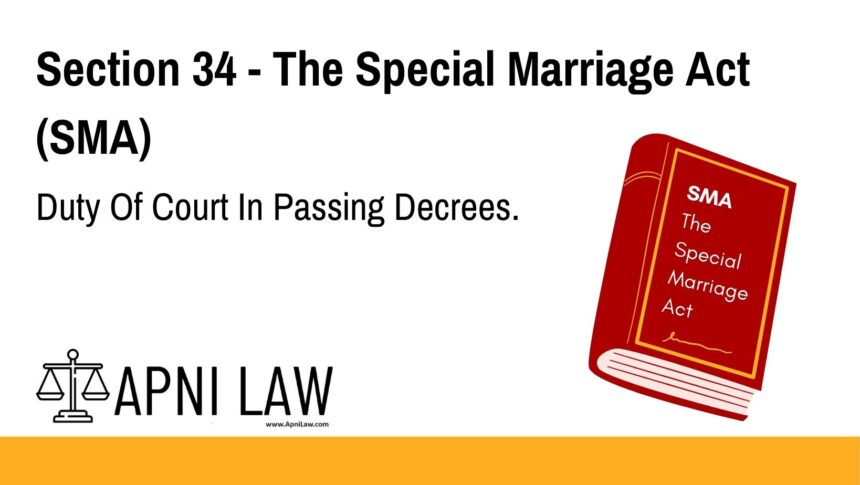Code: Section 34
(1) In any proceeding under Chapter V or Chapter VI, whether defended or not, if the court is satisfied that,—
(a) any of the grounds for granting relief exists; and
(b) where the petition is founded on the ground specified in clause (a) of sub-section (1) of section 27, the petitioner has not in any manner been accessory to or connived at or condoned the act of sexual intercourse referred to therein, or, where the ground of the petition is cruelty, the petitioner has not in any manner condoned the cruelty; and
(c) when divorce is sought on the ground of mutual consent, such consent has not been obtained by force, fraud or undue influence; and
(d) the petition is not presented or prosecuted in collusion with the respondent; and
(e) there has not been any unnecessary or improper delay in instituting the proceedings; and
(f) there is no other legal ground why the relief should not be granted;
then, and in such a case, but not otherwise, the court shall decree such relief accordingly.
(2) Before proceeding to grant any relief under this Act, it shall be the duty of the court in the first instance, in every case where it is possible so to do consistently with the nature and circumstances of the case, to make every endeavour to bring about a reconciliation between the parties:
Provided that nothing contained in this sub-section shall apply to any proceeding wherein relief is sought on any of the grounds specified in clause (c), clause (e), clause (f), clause (g) and clause (h) of sub-section (1) of section 27.
(3) For the purpose of aiding the court in bringing about such reconciliation, the court may, if the parties so desire or if the court thinks it just and proper so to do, adjourn the proceedings for a reasonable period not exceeding fifteen days and refer the matter to any person named by the parties in this behalf or to any person nominated by the court if the parties fail to name any person, with directions to report to the court as to whether reconciliation can be and has been effected and the court shall in disposing of the proceeding have due regard to the report.
(4) In every case where a marriage is dissolved by a decree of divorce, the court passing the decree shall give a copy thereof free of cost to each of the parties.
Explanation of Section 34 – Special Marriage Act
Section 34 lays down the mandatory duties of the court while granting relief under the Special Marriage Act, whether it relates to divorce, judicial separation, or nullity. It ensures that relief is granted only when all legal conditions are met and safeguards against misuse of legal provisions.
It also emphasizes the court’s role in attempting reconciliation between the parties before granting a decree, especially in cases where reconciliation is reasonably possible.
Key Provisions:
- The court must satisfy itself that:
- Valid legal grounds for the petition exist.
- The petitioner has not condoned or been complicit in the misconduct (e.g., adultery or cruelty).
- In mutual consent divorces, consent must be free and not the result of fraud or coercion.
- There is no collusion between the parties.
- There has been no unnecessary delay in filing the petition.
- There is no other legal impediment to granting relief.
- Reconciliation Attempt:
- Courts are required to attempt reconciliation between the parties before granting relief, where possible.
- However, this requirement does not apply to certain serious grounds under Section 27(1)(c), (e), (f), (g), and (h), such as adultery, cruelty, desertion, unsoundness of mind, and communicable diseases.
- Referral for Mediation:
- Courts may adjourn proceedings (up to 15 days) and refer the case for reconciliation through a mediator or person nominated by the parties or the court.
- Free Copy of Divorce Decree:
- Once divorce is granted, the court must provide a free copy of the decree to both parties.
Illustration
Example 1: Valid Petition for Divorce on Grounds of Cruelty
A husband files for divorce alleging cruelty by his spouse. The court confirms that the petitioner has not condoned the cruelty, there is no collusion, and there has been no delay. The court also attempts reconciliation but finds it not possible. A decree of divorce is then granted under Section 34.
Example 2: Mutual Consent Divorce with Undue Influence
A wife challenges a mutual consent divorce claiming her consent was obtained under pressure. The court, under clause (c), investigates and finds the claim valid. The relief is denied as consent was not free.
Common Questions and Answers on Section 34 SMA
Q1. Can a court grant divorce without trying for reconciliation?
No, unless the case falls under exceptions in Section 27(1)(c), (e), (f), (g), or (h), the court must first try to reconcile the parties.
Q2. What is considered “condonation” in a divorce case?
Condonation means forgiving or overlooking a spouse’s misconduct (e.g., cruelty or adultery). If proven, it can prevent the petitioner from obtaining relief.
Q3. Is there a timeline for reconciliation attempts?
Yes. The court may adjourn the matter for reconciliation for a maximum period of 15 days and appoint a conciliator or mediator.
Q4. Is the divorce decree automatically given to both parties?
Yes. The court must provide a copy of the decree free of cost to each party when divorce is granted.
Conclusion
Section 34 ensures that courts exercise caution and diligence before granting matrimonial relief under the Special Marriage Act. It promotes reconciliation where possible and prevents misuse of the law through collusion, coercion, or delay. It reflects the judiciary’s responsibility not just to adjudicate, but to preserve the sanctity of marriage where feasible.
For more practical legal insights into family and marriage laws, explore ApniLaw.








